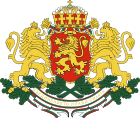- Bulgarian Communist Party
-
Bulgarian Communist Party
Българска комунистическа партия
Balgarska Komunisticheska Partiya
First leader Dimitar Blagoev Last leader Petar Mladenov Founded 1903 Dissolved 1990 Headquarters Sofia, People's Republic of Bulgaria Youth wing Workers Youth League Ideology Communism
Marxism-LeninismPolitical position Far-left International affiliation Comintern (1919-1943), Cominform (1948-1956) European affiliation Balkan Communist Federation (1921-1939) Official colours Red, White Bulgaria 
This article is part of the series:
Politics and government of
BulgariaConstitutionParliamentPresidentJudiciaryDivisions
The Bulgarian Communist Party (BCP) (Българска комунистическа партия / Balgarska Komunisticheska Partiya / БКП/BKP) was the communist and Marxist-Leninist ruling party of the People's Republic of Bulgaria from 1946 until 1990 when the country ceased to be a communist state. The Bulgarian Communist Party had dominated the Fatherland Front coalition that took power in 1944, late in World War II, after it led a coup against Bulgaria's tsarist government in conjunction with the Red Army's crossing the border.
The party's origins lay in the Bulgarian Social Democratic Workers' Party (Narrow Socialists), known as the Tesnyatsi (Tesni Socialisti, "Narrow Socialists"), which was founded in 1903 after a split in the 10th Congress of the Bulgarian Social Democratic Workers' Party.[1]
The party's founding leader was Dimitar Blagoev and its subsequent leaders included Georgi Dimitrov. The party opposed World War I, was sympathetic to the October Revolution in Russia and applied to join the Communist International upon its founding in 1919. Upon joining the Comintern the party was reorganised as the Communist Party of Bulgaria. Dimitrov was a member of the party's Central Committee from its inception until his death in 1949 also serving as Bulgaria's leader from 1946. In 1938 the party merged with the Workers' Party to become the Bulgarian Workers' Party. In 1948 the BWP merged with the Bulgarian Workers' Social Democratic Party to become the Bulgarian Communist Party once again.
Following Dimitrov's sudden death, the party was led by Vulko Chervenkov, a Stalinist sympathiser who oversaw a number of party expulsions that met with Moscow's approval. The party joined the Cominform at its inception in 1948 and conducted expulsions against suspected "Titoites" following the expulsion of the Communist Party of Yugoslavia from the alliance. Suspected counter-revolutionaries outside of the party were imprisoned. In March 1954, one year after Joseph Stalin's death, Chervenkov was deposed.
From 1954 until 1989 the party was led by Todor Zhivkov, who was very supportive of the Soviet Union and remained close to its leadership after Nikita Khrushchev was deposed by Leonid Brezhnev. His rule led to relative political stability and an increase in living standards.[2] The demands for democratic reform which swept Eastern Europe in 1989 led Zhivkov to resign. The party moved in a more moderate direction, with some former members abandoning Marxism-Leninism in 1990 and creating the Bulgarian Socialist Party (BSP).
A number of old Communists established several splinter parties with an insignificant number of members. One of these parties named Communist Party of Bulgaria (Komunisticeska Partija na Balgarija) is a party led by Alexander Paunov.
See also
- History of Bulgaria
- Eastern Bloc politics
References
Ruling Communist parties in the Eastern Bloc Eastern Bloc politicsPeople's Republic of Albania People's Republic of Bulgaria Bulgarian Communist PartyCzechoslovak Socialist Republic German Democratic Republic People's Republic of Hungary People's Republic of Poland People's Republic of Romania Union of Soviet Socialist Republics Socialist Federal Republic of Yugoslavia Categories:- Comintern sections
- Ruling Communist parties
- Political parties established in 1903
- Political parties in Bulgaria
- Communist parties in Bulgaria
- Parties of single-party systems
- Eastern Bloc
- Bulgaria–Soviet Union relations
Wikimedia Foundation. 2010.
